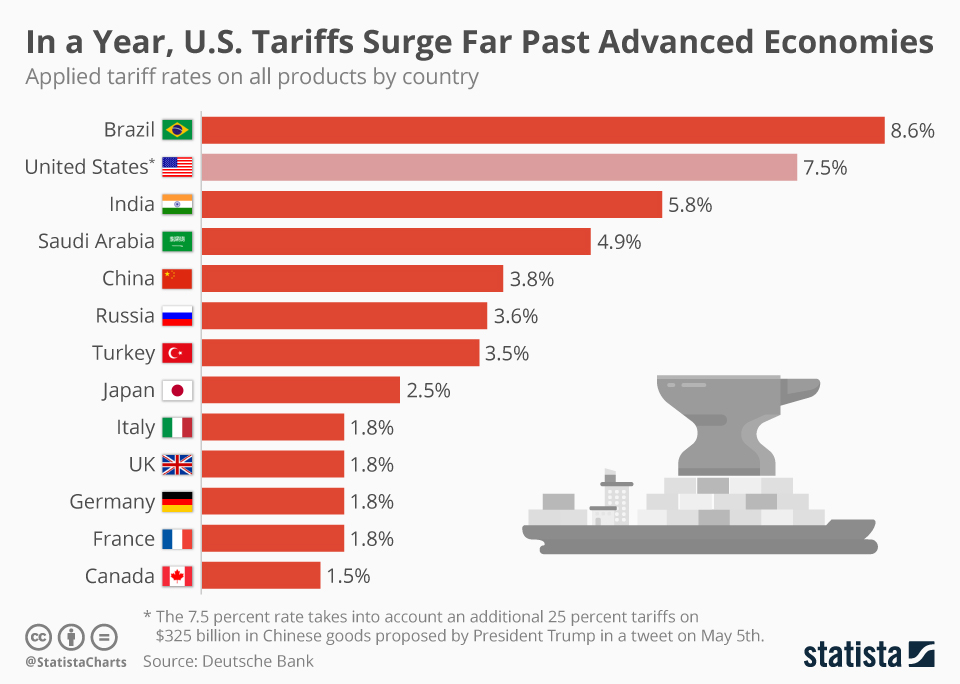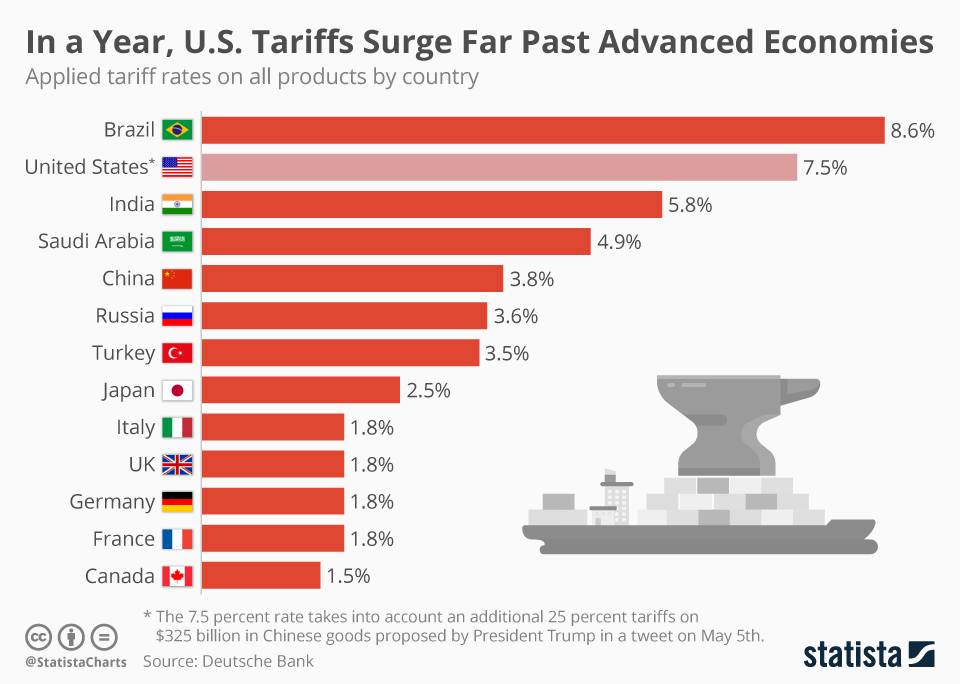Tariffs and the U.S. economy are at the forefront of a heated debate in today’s political landscape. As Republican Senator Rick Scott defends the Trump administration’s tariffs, he argues that these trade barriers are essential for leveling the playing field and empowering American workers. With a dramatic tariff rate imposed on goods from China, the implications of these trade policies extend far beyond borders, stirring discussions about U.S. trade policy and its potential impacts on domestic markets. Critics like economist Jason Furman suggest that such unilateral tariffs might backfire, leading to economic downturns and increased tension in U.S.-China trade relations. As the U.S. navigates these turbulent waters, the outcome of current tariff strategies could define the economic future for American industries and workers alike.
The discussion surrounding trade duties and their influence on the nation’s financial landscape is growing increasingly relevant. Lawmakers, including Senator Scott, portray these levies as crucial tools to bolster the competitiveness of the American workforce against global rivals, particularly concerning import-heavy practices from nations like China. Such measures are positioned within the broader spectrum of U.S. trade negotiations, which aim to reshape how domestic products are perceived and valued internationally. As the conversation unfolds, understanding the ramifications of these fiscal policies becomes crucial, especially in light of contrasting views from various economists about the future of trade and economic health. Ultimately, navigating these complex trade relationships will require a delicate balance to foster both national interests and a stable economy.
Understanding Tariffs and Their Impact on the U.S. Economy
Tariffs play a crucial role in shaping the U.S. economy, especially when it comes to protecting American workers and industries. Under the recent trade policies advocated by Republican Senator Rick Scott, tariffs are seen as a strategic tool to level the playing field against countries that maintain lower trade barriers. Scott argues that imposing these tariffs is essential for encouraging other nations to reduce their own tariffs on U.S. goods, allowing American products to become more competitive globally.
The implementation of tariffs, particularly those introduced during the Trump administration, aims to promote U.S. manufacturing and address trade deficits that have long plagued the economy. However, this approach has sparked significant debate among economists, with many asserting that such tariffs could lead to higher consumer prices and potential backlash from other countries, particularly China. As Scott emphasizes, the goal is to enhance the standing of American workers, but the broader economic consequences must also be carefully examined.
Rick Scott’s Defense of the Trump Administration’s Tariff Strategy
Senator Rick Scott’s firm defense of the Trump administration’s tariff strategy highlights his commitment to protecting the interests of American workers. By placing significant tariffs on imports, particularly from China, Scott believes that the U.S. can stimulate domestic production and ensure that American companies compete on fair terms. His assertion that American workers will benefit from these policies underscores a prevailing sentiment among certain lawmakers that tariffs can serve as a deterrent against unfair trade practices.
Moreover, Scott’s perspective sheds light on the complexity of U.S. trade policy and its implications for international relations. His stark position against trade with China showcases a broader concern regarding national security and economic stability. By advocating for stronger tariffs against Chinese imports, Scott seeks not only to bolster the economy but also to address geopolitical issues that may arise from excessive reliance on Chinese goods.
The Relationship between Tariffs, Inflation, and Economic Growth
The recent discussions surrounding tariffs have brought to the forefront concerns regarding inflation and its impact on economic growth. Senator Rick Scott voiced uncertainty about the relationship between tariffs and inflation rates, particularly as the U.S. grapples with rising costs of goods and services. While tariffs are intended to protect domestic industries, they may inadvertently contribute to inflation by increasing the cost of imported goods, a point raised by economists like Jason Furman.
As the U.S. economy navigates these turbulent waters, understanding the balance between tariffs and inflation becomes critical. Scott’s suggestion that a balanced budget is necessary to control inflation adds another layer to this discussion, suggesting that fiscal responsibility may be essential in tandem with trade policies. Ultimately, the impact of tariffs on the economy remains a contentious issue, with stakeholders advocating for different approaches to support both economic growth and price stability.
China Trade Relations: A Key Concern for U.S. Economists
In the context of U.S. trade policy, China remains a focal point of concern for policymakers and economists alike. Senator Rick Scott’s view that trade with China should be significantly curtailed reflects a growing apprehension about the nation’s economic power and its implications for American interests. As evidenced by the staggering tariff rates imposed on Chinese imports, the U.S. is clearly signaling that it views China as a critical competitor, one that poses significant challenges to the American economy.
The ongoing trade tensions with China have prompted many to reconsider the overall effectiveness of tariffs as an economic strategy. While the Trump administration’s tariffs were designed to protect U.S. industries and promote American jobs, critics argue that they may only exacerbate existing tensions and lead to retaliatory measures by China. This cycle of escalating tariffs not only complicates trade relations but also risks creating a less stable economic environment for both countries involved.
Impact of Tariffs on American Workers and Industries
The imposition of tariffs has profound implications for American workers, as emphasized by Senator Rick Scott during discussions about U.S. trade policy. By leveraging tariffs as a means to protect domestic industries, the government aims to empower American labor and enhance job stability. Scott’s assertion that these tariffs will eliminate barriers for American workers speaks to a larger narrative around improving the livelihoods of those in manufacturing and related sectors.
However, the direct consequences of these tariffs on American workers are not universally positive. While some sectors may benefit from increased protection, others might suffer from higher costs or limited access to foreign markets. This duality highlights the complexity of tariff implementation and its varying effects across different industries. As policymakers evaluate the effectiveness of these tariffs, the balance between protecting American jobs and ensuring competitive pricing for consumers remains a contentious issue.
Debate Over Unilateral Tariffs: Potential Consequences
The debate surrounding unilateral tariffs has ignited discussions about their long-term effectiveness in reshaping U.S. trade policy. During an event hosted by Harvard’s JFK Jr. Forum, Senator Rick Scott faced critical questions about whether negotiations with trading partners might have yielded better outcomes than unilateral tariffs. Critics argue that unilateral actions could provoke retaliatory tariffs, further complicating international trade relations and leading to economic volatility.
Senator Scott remains firm in his belief that imposing tariffs is a necessary action to protect American interests, expressing a vision where negotiations may be less effective than immediate authoritative measures. The tension between pursuing unilateral tariffs and engaging in trade negotiations underscores a divide in perspectives on the best approach to fostering fair trade. As the U.S. evaluates its trade strategy, the repercussions of these decisions will resonate across various sectors of the economy.
Economic Volatility: The Impact of Tariffs on GDP
Recent tariff implementations have sparked significant economic volatility, particularly impacting the gross domestic product (GDP) of the United States. Following the announcement of new tariffs, markets experienced jitters, reflecting investor concerns about the potential ramifications on economic growth. The contraction in GDP in the first quarter, partially attributed to the tariff strategy, raises questions about the sustainability of such aggressive trade policies.
Senator Scott’s advocacy for tariffs as a means to enhance the competitiveness of American industries runs the risk of unintended economic consequences. As economic indicators fluctuate in response to these measures, the debate intensifies around whether such tariffs will ultimately benefit or hinder the very workers they are designed to protect. The relationship between tariffs and overall economic performance remains an area ripe for further analysis in light of these developments.
Future of U.S. Trade Policy: Balancing Protection and Growth
As the U.S. grapples with its trade policy direction, the need for a balanced approach becomes more critical than ever. Senator Rick Scott’s support for strong tariffs reflects a desire to protect American jobs, but it also poses challenges that must be navigated carefully. The future of U.S. trade policy may hinge on finding the right equilibrium between protecting domestic industries and fostering a globally competitive market.
In pursuit of this balance, stakeholders must consider various factors, including international relations, economic sustainability, and the welfare of American consumers. The ongoing dialogue around tariffs invites a broader consideration of how to best support American workers while ensuring that the U.S. remains an active player in the global economy. Ultimately, the evolution of U.S. trade policy in response to these challenges will shape the economic landscape for years to come.
Lessons Learned from Previous Tariff Strategies
The history of U.S. tariff strategies offers valuable lessons for contemporary policymakers examining the potential impacts of tariffs on the economy. The Trump administration’s approach to tariffs, particularly regarding China, has served as a notable case study in the complexities of trade relations. As Senator Rick Scott defends tariffs as a necessary means to protect American interests, it is essential to analyze previous tariff implementations and their outcomes.
Examining past strategies provides insights into what works and what does not when navigating international trade. As discussions continue regarding the effectiveness of current tariffs, understanding the successes and failures of historical tariff policies will be crucial in shaping future approaches. The lessons learned can guide U.S. leaders in establishing a trade policy that promotes economic growth while safeguarding American jobs and industries.
Frequently Asked Questions
How do Rick Scott’s tariffs aim to benefit the U.S. economy?
Rick Scott believes that the tariffs introduced by the Trump administration will create a level playing field for American workers by eliminating barriers on U.S. goods. His stance is that these tariffs will encourage other nations to reduce their own tariffs, ultimately leading to more sales for American workers and a boost in the U.S. economy.
What impact do tariffs have on U.S.-China trade relations?
The tariffs imposed on China by the Trump administration, which can reach up to 145%, have a significant impact on U.S.-China trade relations. They are intended to address trade deficits and protect American manufacturing but have also resulted in retaliatory tariffs from China, complicating trade negotiations and impacting the overall U.S. economy.
What are the potential economic consequences of Trump administration tariffs?
While supporters like Rick Scott argue that Trump administration tariffs will ultimately benefit American workers, critics, including economists like Jason Furman, warn that they could lead to increased inflation and economic contraction. The tariffs may disrupt supply chains and add costs for consumers, posing a risk to economic growth in the U.S.
How are tariffs related to U.S. trade policy?
Tariffs are a crucial component of U.S. trade policy, particularly under the Trump administration. They aim to reshape trade dynamics by protecting domestic industries and encouraging negotiations for lower tariffs from other countries, which proponents like Rick Scott argue will strengthen the U.S. economy and support American workers.
Will tariffs lead to inflation in the U.S. economy?
The link between tariffs and inflation is uncertain, as indicated by Rick Scott. While tariffs can increase the cost of imported goods, leading to potential inflation, Scott believes that controlling inflation requires balancing the budget rather than solely relying on tariff strategies. The overall economic impact of tariffs on inflation remains a topic of debate among economists.
What is Rick Scott’s perspective on trade with China under the tariff policy?
Rick Scott has a critical view of trade with China, suggesting that the U.S. should limit trade with the nation. He argues that the imposition of high tariffs on Chinese imports is a necessary measure to protect American interests and prevent economic competition that could lead to further tensions.
How do tariffs impact American workers according to proponents like Rick Scott?
Proponents like Rick Scott assert that tariffs protect American jobs by discouraging imports and encouraging domestic manufacturing. Tariffs are viewed as a means to enhance the bargaining power of American workers in global markets by ensuring that foreign competitors face similar trade barriers.
What are the criticisms of tariffs in relation to the U.S. economy?
Critics of tariffs, including many economists, argue that they can harm the U.S. economy by increasing prices for consumers, disrupting trade relationships, and potentially leading to retaliatory measures from other nations. These factors could overshadow the intended benefits for American workers and manufacturers.
| Key Points | Details |
|---|---|
| Sen. Rick Scott’s View | Scott supports tariffs as a way to benefit U.S. workers and balance international trade. |
| Response to Tariffs | He argues that tariffs from the Trump administration will encourage other countries to reduce their tariffs on American goods. |
| Impact on the Economy | There is volatility in global markets, with fear of an economic downturn affecting U.S. GDP negatively. |
| Trade Relations with China | Scott believes that trade with China should cease to diminish the threat it poses to the U.S. |
| Tariff Rates | A 10% tariff on most nations, with a significant 145% on China. |
| Concerns about National Debt | Scott emphasizes the need for a balanced budget and reduced spending to improve fiscal health. |
| Tariffs and Inflation | Scott is uncertain about the impact of tariffs on inflation but notes a balanced budget is crucial for control. |
Summary
Tariffs and the U.S. economy have been a focal point of political discourse, particularly in light of recent developments in trade policy. Senator Rick Scott argues that implementing tariffs can create a more level playing field for American workers, allowing them to compete effectively against foreign producers. However, this approach has sparked significant debate among economists regarding its potential ramifications on the economy. The imposition of tariffs has generated market volatility and raised concerns about trade deficits, particularly concerning China. As the U.S. navigates these challenges, balancing tariffs with robust economic strategies remains crucial for sustaining growth.



